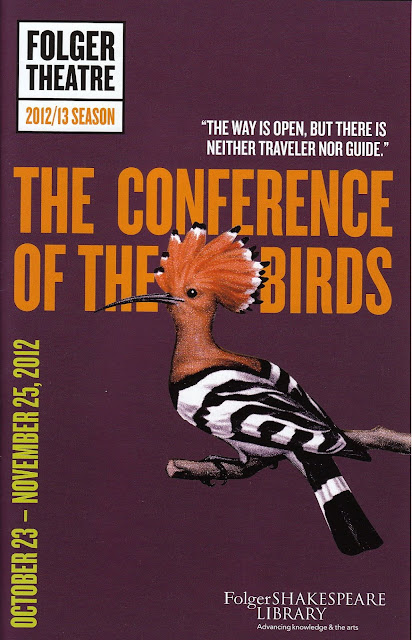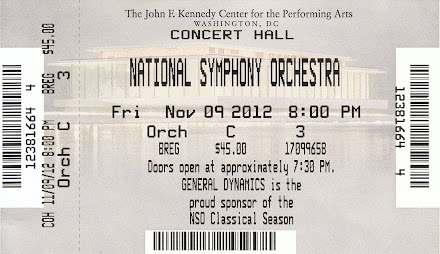
|
Posner, A., Director's Notes: The Conference of the Birds. Beland, J., ‘The Conference of the Birds’ @Folger Theatre, Brightest Young Things - DC, November 12, 2012. Gilbert, S., Theater Review: ‘The Conference of the Birds’ at Folger Theatre: A 12th-century fable makes for a creative and often mesmerizing spectacle, The Washingtonian, November 2, 2012. Gunther, A., ‘The Conference of the Birds’ at Folger Theatre, DC Metro Theater Arts, October 31, 2012. |
|

|
Tuesday, November 20, 2012
The Conference of the Birds at the Folger Theatre
Sunday, November 18, 2012
Saturday, November 17, 2012
Roads of Arabia at the Sackler Gallery

|

|

|

|
Since its opening November 17, "Roads of Arabia: Archaeology and History of the Kingdom of Saudi Arabia" has been earning rave reviews from outlets such as the Wall Street Journal, BBC and The Washington Post.
|
Please enjoy select coverage from international, national and local media outlets:
BBC News, Washington: "Uncovering the hidden bodies in Saudi art," "Saudi exhibition marks cultural revolution"
McClatchy Newspapers: "D.C. exhibit details history, complexities of the Arabian Peninsula"
Smithsonian Magazine: "'Roads of Arabia' Presents Hundreds of Recent Finds That Recast the Region's History," "Q+A: Saudi Arabia's Sultan bin Salman on 'Roads of Arabia'"
DCist: "Review: 'Roads of Arabia'"
The Wall Street Journal: "Rescued From Saudi Sands"
The Washington Post: "In 'Roads of Arabia,' dusting off ideas about a kingdom and civilization"
The Washington Times: "An Arabian road show"
|
Friday, November 9, 2012
Dvořák's Seventh with Eschenbach/NSO
Wednesday, November 7, 2012
Lang Lang / Christoph Eschenbach piano recital at the Kennedy Center

|
Much more sensible review in the WP than the one for the previous recital. Indeed, “Eschenbach projects a kind of monkish restraint, but he may actually be the more flamboyant, the more emotional of the two. Lang Lang is certainly given to big gestures, but there's also a solid through line, where Eschenbach can be episodic.” “The performance was certainly a heartfelt exchange between two musicians, playing on two equal instruments, facing each other.”And that was strange: while “For Two Pianos” means just that, “For Four Hands” implies sharing the keyboard of the same instrument. Yet, it was only at the very end, with the Debussy encore, when the two musicians actually played on the same piano. Midgette, A., Coming to appreciate Lang Lang, Washington Post, November 8, 2012. |
|

|
Sunday, November 4, 2012
Lang Lang in Mozart/Chopin recital at the Kennedy Center

|
 |
 |
Deceptively simple Mozart's early piano sonatas are among the hardest to “get right.” One of my favorite recordings of Mozart's piano sonatas is that of Claudio Arrau, and he was in his 80's when he made it.
All the more stunning then is the maturity and depth of interpretation shown by 30-year-old Lang Lang. Balance, contrast, and logical flow of movements in each of the three sonatas: thoughtful sound dynamic, from gossamer pianissimo to masculine forte, with all the nuances in between; contemplative, even meditative, approach, as if music fabric is being woven right before your eyes, here and now; and—the sign of true mastery—the musician is not afraid of rests, each extended pause feeling like an intake of breath: the music is alive, and there is no hint of mechanical predictability. It is truly gratifying that the pianist's considerable virtuosity is subordinate to solving a purely musical task: in discovering his Mozart, Lang Lang has managed to reveal facets both Beethovenian and Schubertian. Moreover, the often overlooked introspection in the early Mozart's sonatas is what has bridged two parts of the Sunday's recital, bringing together composers so different as Mozart and Chopin.
Finally, it is impossible not to notice the formidable expressive power of the pianist's left hand, contributing mightily to what Abram Yusfin called “the discernability of musical texture:” the clarity and gravitas of themes played by the left hand sometimes creating a counterpoint to, other times flowing effortlessly into the themes in the right hand. I wouldn't be surprised if the sense of musical form coupled with the expressiveness of his gesture might lead Lang Lang eventually to a conducting career.




